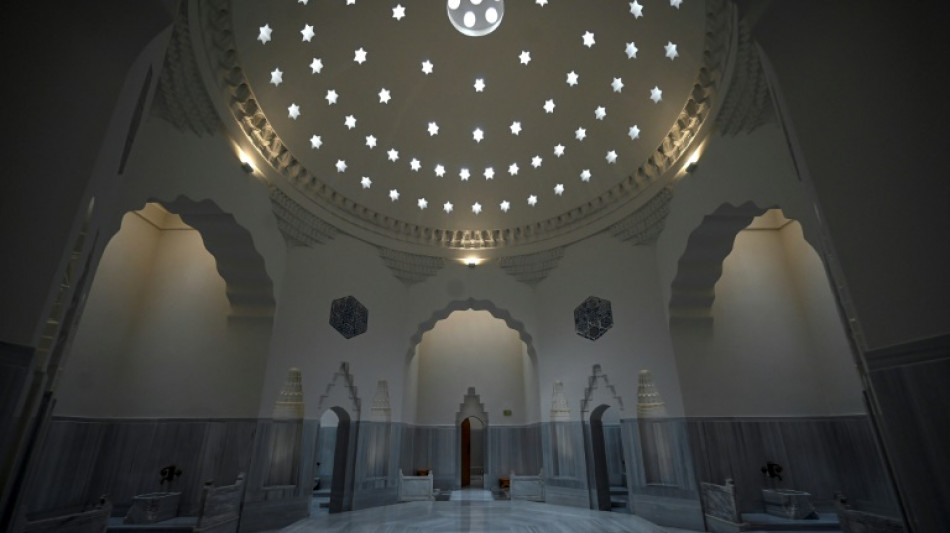
-
 Turkey bans elective C-sections at private medical centres
Turkey bans elective C-sections at private medical centres
-
Lebanon army says 3 troops killed in munitions blast in south

-
 N.America moviegoers embrace 'Sinners' on Easter weekend
N.America moviegoers embrace 'Sinners' on Easter weekend
-
Man Utd 'lack a lot' admits Amorim after Wolves loss

-
 Arteta hopes Arsenal star Saka will be fit to face PSG
Arteta hopes Arsenal star Saka will be fit to face PSG
-
Ukrainian troops celebrate Easter as blasts punctuate Putin's truce

-
 Rune defeats Alcaraz to win Barcelona Open
Rune defeats Alcaraz to win Barcelona Open
-
Outsider Skjelmose in Amstel Gold heist ahead of Pogacar and Evenepoel

-
 Arsenal make Liverpool wait for title party, Chelsea beat Fulham
Arsenal make Liverpool wait for title party, Chelsea beat Fulham
-
Trump slams 'weak' judges as deportation row intensifies

-
 Arsenal stroll makes Liverpool wait for title as Ipswich face relegation
Arsenal stroll makes Liverpool wait for title as Ipswich face relegation
-
Sabalenka to face Ostapenko in Stuttgart final

-
 Kohli, Padikkal guide Bengaluru to revenge win over Punjab
Kohli, Padikkal guide Bengaluru to revenge win over Punjab
-
US aid cuts strain response to health crises worldwide: WHO

-
 Birthday boy Zverev roars back to form with Munich win
Birthday boy Zverev roars back to form with Munich win
-
Ostapenko eases past Alexandrova into Stuttgart final

-
 Zimbabwe on top in first Test after Bangladesh out for 191
Zimbabwe on top in first Test after Bangladesh out for 191
-
De Bruyne 'surprised' over Man City exit

-
 Frail Pope Francis takes to popemobile to greet Easter crowd
Frail Pope Francis takes to popemobile to greet Easter crowd
-
Lewandowski injury confirmed in blow to Barca quadruple bid

-
 Russia and Ukraine accuse each other of breaching Easter truce
Russia and Ukraine accuse each other of breaching Easter truce
-
Zimbabwe bowl Bangladesh out for 191 in first Test in Sylhet

-
 Ukrainians voice scepticism on Easter truce
Ukrainians voice scepticism on Easter truce
-
Pope wishes 'Happy Easter' to faithful in appearance at St Peter's Square

-
 Sri Lanka police probe photo of Buddha tooth relic
Sri Lanka police probe photo of Buddha tooth relic
-
Home hero Wu wows Shanghai crowds by charging to China Open win

-
 Less Soviet, more inspiring: Kyrgyzstan seeks new anthem
Less Soviet, more inspiring: Kyrgyzstan seeks new anthem
-
Defending champion Kyren Wilson crashes out in first round of World Snooker Championship

-
 NASA's oldest active astronaut returns to Earth on 70th birthday
NASA's oldest active astronaut returns to Earth on 70th birthday
-
Exec linked to Bangkok building collapse arrested

-
 Zelensky says Russian attacks ongoing despite Putin's Easter truce
Zelensky says Russian attacks ongoing despite Putin's Easter truce
-
Vaibhav Suryavanshi: the 14-year-old whose IPL dream came true

-
 Six drowning deaths as huge waves hit Australian coast
Six drowning deaths as huge waves hit Australian coast
-
Ukrainian soldiers' lovers kept waiting as war drags on

-
 T'Wolves dominate Lakers, Nuggets edge Clippers as NBA playoffs start
T'Wolves dominate Lakers, Nuggets edge Clippers as NBA playoffs start
-
Taxes on super rich and tech giants stall under Trump

-
 Star Wars series 'Andor' back for final season
Star Wars series 'Andor' back for final season
-
Neighbours improvise first aid for wounded in besieged Sudan city

-
 Tariffs could lift Boeing and Airbus plane prices even higher
Tariffs could lift Boeing and Airbus plane prices even higher
-
Analysts warn US could be handing chip market to China

-
 Unbeaten Miami edge Columbus in front of big MLS crowd in Cleveland
Unbeaten Miami edge Columbus in front of big MLS crowd in Cleveland
-
Social media helps fuel growing 'sex tourism' in Japan

-
 'Pandora's box': alarm bells in Indonesia over rising military role
'Pandora's box': alarm bells in Indonesia over rising military role
-
Alaalatoa hails 'hustling hard' Brumbies for rare Super Rugby clean sheet

-
 Trio share lead at tight LA Championship
Trio share lead at tight LA Championship
-
Sampdoria fighting relegation disaster as old heroes ride into town

-
 Recovering pope expected to delight crowds at Easter Sunday mass
Recovering pope expected to delight crowds at Easter Sunday mass
-
Nuggets edge Clippers in NBA playoff overtime thriller, Knicks and Pacers win

-
 Force skipper clueless about extra-time rules in pulsating Super Rugby draw
Force skipper clueless about extra-time rules in pulsating Super Rugby draw
-
Nuggets edge Clippers in NBA playoff overtime thriller, Pacers thump Bucks


Turkey scrubs up its baths to keep hammam tradition alive
For centuries, hammams were central to Ottoman society, and while they mostly fell out of use with the advent of running water, many in Turkey are being restored to revive an ancient ritual bathing tradition.
A mainstay of old Turkish films, hammam scenes were highly entertaining, a free space where women would socialise, eat, drink and even dance.
Last year, Istanbul's 500-year-old Zeyrek Cinili Hammam -- built during the reign of Suleiman the Magnificent by the celebrated Ottoman architect Sinan -- reopened after a painstaking 13-year restoration.
Alongside a functioning hammam, it also houses a museum explaining its history and the Ottoman ritual of bathing.
"The restoration somehow turned into an archaeological dig" that gave insight into how the hammam once looked, museum manager Beril Gur Tanyeli told AFP.
"Around 3,000 pieces of missing tiles were found which helped solve the puzzle of why this hammam was called Cinili" -- Turkish for "covered with tiles".
The beautiful Iznik tiles that once lined its walls were exclusively produced for the hammam. No other bathhouse had such a rich interior, museum officials say.
Although most were damaged by fires or earthquakes, or sold off to European antique dealers in the 19th century, some are still visible.
The restoration also exposed several Byzantine cisterns beneath the hammam.
"Sinan the Architect is believed to have built the hammam on top of these cisterns to use them as a foundation and as a source of water," Tanyeli said.
- From cleansing to celebration -
In ancient Rome, bathing culture was very important and it was "traditional for traders to wash before entering the city, especially in baths at the (city) entrance," archaeologist Gurol Tali told AFP.
During the Ottoman empire, a golden age for bathhouses, the ritual symbolised both bodily cleanliness and purity of soul.
In Islam, a Muslim must wash before praying, in an act known as ablution.
Hammams were also a place for celebrating births and weddings.
"Baths were used not only for cleansing the body but for socialising, relaxing, healing and even celebrating important life events," with special rites for brides, soldiers and young boys before they were circumcised, Tali said.
Since households at the time did not have running water, hammams were an essential part of life until the 19th century, with census figures from 1638 showing there were 14,536 public and private baths in Istanbul, the museum said.
And that tradition has survived until today.
"You come here to get clean and leave handsome," said Zafer Akgul, who was visiting a hammam in the city with his son, telling AFP he visited often, particularly during religious feasts or for a wedding.
"We don't want this tradition to die."
- 'Passing on cultural heritage' -
That is where Istanbul's ancient hammams can serve a bigger purpose, Tali said.
"Restoring historical baths in Istanbul and putting them to use may be the most effective way to transfer cultural heritage to future generations," he said.
Another nearby bathhouse from the same era, the Bayezid II Hammam, underwent years of restoration and reopened as a museum in 2015.
One of the largest hammams in the city at the time, some historians believe it was where a notorious male bathing attendant, or "tellak", called Halil plotted an uprising in 1730 that overthrew Sultan Ahmed III.
For Manolya Gokgoz, who does publicity for Cemberlitas Hammam, another 16th-century bathhouse built by Sinan, the connection is more personal: her grandmother worked there as a "natir" -- a woman's bathing attendant.
"When I was two or three years old, I would go to the baths in the morning, wash and play by myself until the evening without getting bored," she told AFP.
For Gokgoz, the tradition lives on -- although mostly among tourists, which for her is a shame.
"In the past, we used to go to the hammam with our mothers and grandmothers. Now 70 percent of our customers are foreign tourists and 30 percent locals," she said.
These days, the full hammam experience -- which lets bathers relax in hot, warm or cool pools alongside extras like massages or peeling -- is expensive, with the basic service costing around $100.
Celebrities, both Turkish and international, often visit Cemberlitas, with the last being Spanish actor Pedro Alonso -- the character Berlin in the Netflix hit "Money Heist" -- visiting in September.
"Hammam is not a luxury, but a need," Gokgoz said.
"Yes, it's not like in the past because we have hot water at our fingertips, but we need to keep this tradition alive."
L.Stucki--VB


